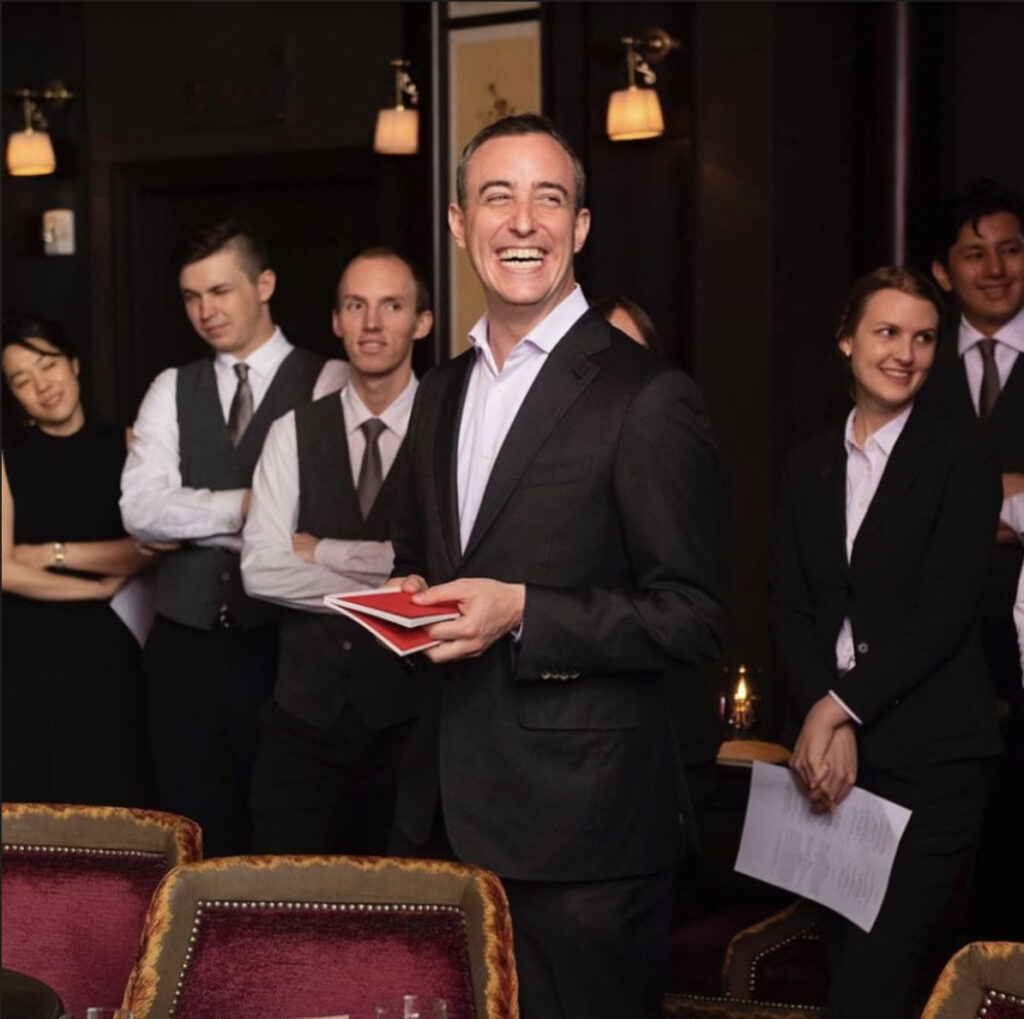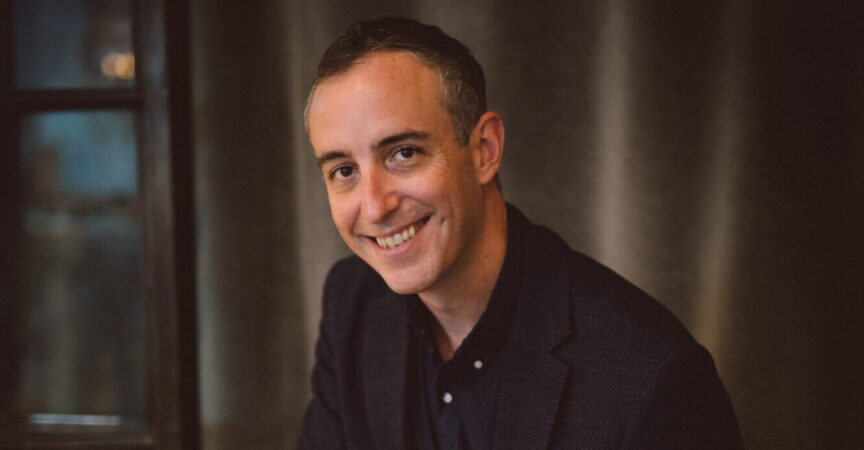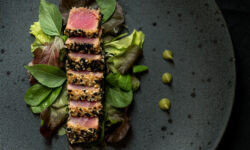THE POWER OF BEING UNREASONABLE: IN CONVERSATION WITH LEGENDARY RESTAURATEUR WILL GUIDARA
New York City’s Eleven Madison Park and its meteoric rise to number one on the World’s 50 Best Restaurants list in 2017 is one of the industry’s most inspirational tales of legend and lore. The essence of the story is that then-partners Will Guidara and Chef Daniel Humm took a brasserie that had never quite met its potential and, in a little over a decade, transformed it into the best restaurant on the planet. While the food was (and would have had to be) extraordinary, they earned global acclaim by changing the rules, elevating and crafting the front-of-house service to match the refined culinary standards and extraordinary reputation typically owned by the back-of-house.
Since then, Guidara has embarked on a new journey, sharing what he has learned with the industry he loves. Guidara is a “hospitality guy” who wants people to be inspired by the idea that hospitality is just as much of a craft as cooking—a craft that can be pursued and delivered with intent, to great effect and profit.
We had the opportunity to speak with Guidara leading up to his fireside chat at RC Show’s Breakfast With Champions about the philosophy behind his book, Unreasonable Hospitality: The Power of Giving People More Than They Expect, and his deep belief that any restaurant or any business can find new purpose and value in being “unreasonable”.
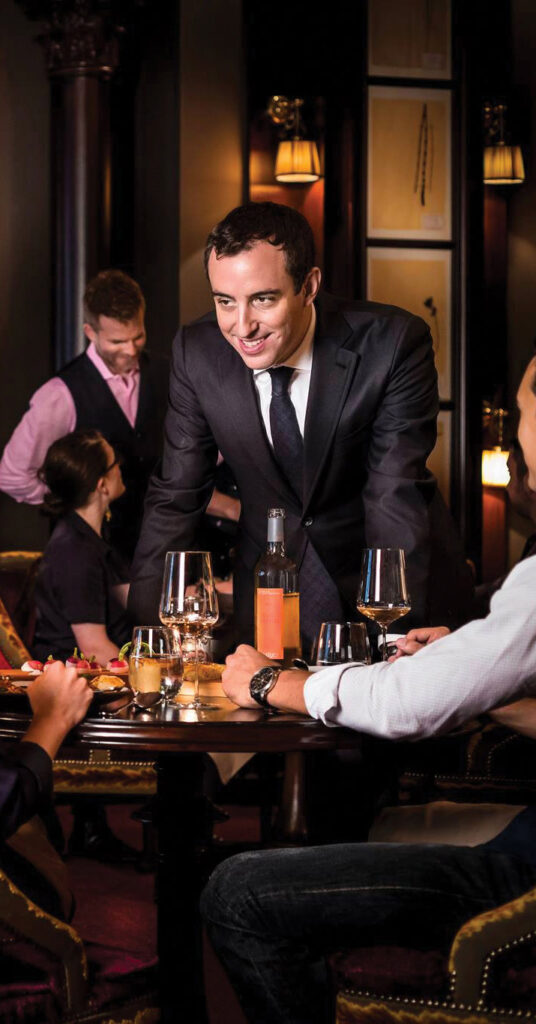
MENU: The idea that sparked your book (and the fully realized hospitality concept it contains) was originally scrawled on a napkin after Eleven Madison Park first made the World’s 50 Best Restaurants list, coming in at #50. What is the meaning of “unreasonable hospitality”— what were you thinking when you wrote those words?
Why the words “unreasonable hospitality”… There’s this behavioural scientist, Rory Sutherland, who says, “The opposite of a good idea can be another good idea”. A good idea is not me saying, “You know what? I want to make food that tastes good.” That’s not a good idea—there’s no innovation there. Reasonable Hospitality works…the opposite of “unreasonable” is “reasonable”. I think that’s why. I really love that name. And honestly, it’s how I defended the name when the publishers pushed back on it. It really struck a chord with me that the opposite of a great idea does need to be a good idea. Otherwise, it’s not that innovative an idea at all.
When you look across disciplines, almost without exception, the people that are most successful are those that pursue the product they create to sell with relentlessness. They’re willing to do whatever it takes to make the product its most fully realized “self”. They’re unreasonable in their pursuit of creating something that changes the game. Whether that’s a work of fiction, a movie, a piece of technology or how an athlete chooses to change the approach that they take to play in the game—you need to be unreasonable to see a world that does not yet exist.
I think that, in many worlds, choosing the unreasonable path is celebrated. That sense of relentlessness is celebrated. For me, unreasonable hospitality is my way of pleading with the world that we should choose to be just as relentless, just as unreasonable, just as willing to do whatever it takes—not just in pursuit of the product we’re serving or selling to people, but also in pursuit of how we make people feel. If we brought just as much unbridled creativity to creating the conditions for connection, both with the people we work with and those who we serve, A) businesses would be more profitable, B) customers would be happier and C) perhaps most importantly, everyone involved in creating the experience, the product or the idea would be more fulfilled.
When you look across disciplines, almost without exception, the people that are most successful are those that pursue the product they create to sell with relentlessness. They’re willing to do whatever it takes to make the product its most fully realized “self”. They’re unreasonable in their pursuit of creating something that changes the game.
Why did I write it on that napkin then? Most of it was a reaction to what I saw happening in kitchens with chefs, everywhere. I wanted to have the number one restaurant in the world, A) for the accolade and B) because of the global impact it would have represented I had made. I think it’s is a basic human desire that we have some amount of impact on the world that we’re most passionate about.
It’s patently absurd to say that one restaurant is the best restaurant in the world. Being on the top of that list signifies that you are the most impactful restaurant in the world of restaurants on that year. When I looked at the restaurants that topped the list before us—whether it was El Bulli… Noma—it’s because they moved the conversation forward substantially in pursuit of what needed to change on the plates that they were serving, and the chefs were unreasonable in pursuit of affecting that change.
I think when you try to figure out what your impact can be, you need to first stop and look at what your superpowers are. And I was one of the few people in that room that wasn’t a chef—I was the hospitality guy. And so in moments where you’re trying to figure out how to create impact, you need to first pause and look at where your strengths are and seize on them. And so, that night I wanted to emulate their persistence, but pair it with my superpower.
MENU: You seem to be a person on a mission. Like you’ve discovered something you believe in and that has returned substantive value, earning Eleven Madison Park the number one spot on the World’s 50 Best Restaurants list and the inaugural Art of Hospitality award. Why do you feel compelled to share?
I don’t believe hospitality is a trade secret, or that the approach you take to it is a trade secret. It’s like asking a chef, “Why did they publish a cookbook?” Now everyone has their recipes. The idea is that the chef will continue innovating and developing new recipes. So it’s not like you’re done evolving and you’ve shared your stuff, and now you have no more competitive advantage. My hope is that I’m still pretty young and I want to create more and do more and I haven’t just given everything away. Also, I think it would go completely against the fundamental idea of what I’m trying to assert if I wanted to hog what I’ve learned and not share it. I think hospitality implies generosity. Danny Meyer, who is one of the two biggest mentors in my life always says, “A high tide raises all boats”. I think there’s plenty of restaurants out there, and other restaurants being great doesn’t prevent me from being great. I believe the more people that care about hospitality and that view hospitality as a muscle that can be strengthened, a craft that can be practiced, the better our industry will be.
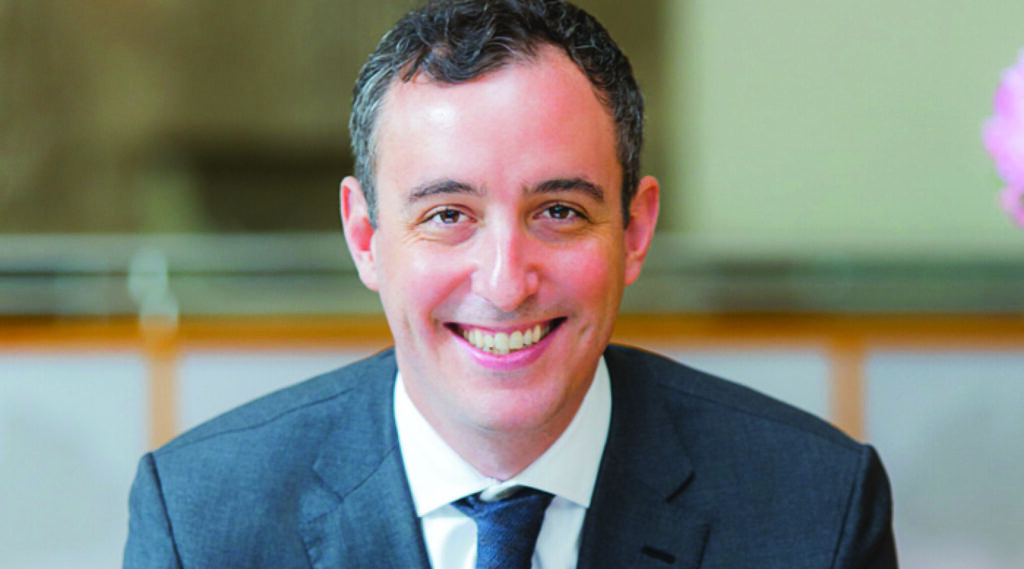
MENU: Is this a radical new idea or a foundational idea that’s finally found its time?
I will never be the person that says my own idea was radical. But let’s just look at restaurants for a moment. If you look at food 30 years ago versus today, the envelope has been pushed dramatically. People are doing more and trying harder. More technique, more focused on ingredients, more focused on training presentation—everything. There is nothing radical about the idea of hospitality—I think that is what restaurants were created to represent. If you look at the original restaurant, it was about restoring people on a long journey while they were travelling, right? Restaurants were founded not on the quality of the food they were serving, but on the desire to nourish the people that they were serving it to.
My entire philosophy is built on the foundation that Danny Meyer gave me. I’m the first to say that my body of work is remarkably inspired by his. I think if there’s anything radical about it, it’s saying that we need to focus on hospitality now in the same way that people on the product side have been focusing on the product for a while now. The innovation, if there is one, is that restaurants are not just about the food. The food is not the only artistry and craft. It’s the hospitality too. And we need to supercharge the way we make people feel in the same way that chefs have been unbelievably celebrated for supercharging the approach they’ve been taking to the cuisine.
MENU: How has the process of success—of having an idea, implementing that idea and watching it resonate and succeed—changed you?
Having an idea that succeeds… I think it gives you confidence, which is a hugely important thing if you’re endeavouring to create and innovate. The worst thing you can have is a sense of insecurity about your ideas. When you take a big swing and you strike out, you can recover from it—I’ve recovered from it— but it sets you back. When you take a big swing and it works, it gives you confidence and conviction in your ideas and confidence and conviction to reach for the stars again. And I think that’s a beautiful thing.
I’m a dad now, and one of the things I want to instill in my kids, more than anything, is a sense of confidence. As far as this specific idea, a big part of the book is how you can make unreasonable hospitality into a practice, how you can systemize graciousness. I’ve most certainly brought that into how I serve the people that I work with, how I engage with my wife, with my friends, with my family. Very often, when I am explaining something to my team, I use examples of how we pursue relationships in life to explain how the same rules apply when we’re serving people at work. It’s a beautiful thing when it flows in the other direction, from life to work, because invariably we are more intentional about establishing systems at work than we are in life. And when you can use the lessons you’ve learned from establishing systems at work to make you someone you’re more proud to be in life. I think that’s pretty cool.
MENU: You’re describing a kind of a “system” that has value in both work and life—an idea with almost “religious” qualities. If it’s systemized, is it still authentic?
We all create systems all the time. I believe if you care about something and you don’t systemize it—create a practice of it—you won’t pursue it consistently and set yourself up for success. I’m very anal retentive. I like everything to look perfect, which means there’s nothing out on my bathroom counter.
But, I have medicine that was prescribed to me to take every single night that needs to be out—otherwise I won’t take it every single night. I created a very simple system. I just leave it out on the sink because it drives me crazy and so I notice it every single time I’m brushing my teeth. We all figure out what we need to do to create practices so that we pursue the things we either love to do or know are good for us to do. And so, I think systemizing something means that it’s so important to you that you’re willing to put in the work to make sure that you pursue it consistently.
MENU: How does unreasonable hospitality work? Does it translate into stronger business and drive profitability?
Materially and dramatically. Those of us in the restaurant business need to recognize that we are serving experiences—by the way, it’s a great business to be in right now. People don’t collect things anymore. They want to collect experiences. And so, the opportunity—perhaps even the responsibility— we have is to give people a story that can help them relive that experience over and over again, such that it’s an experience worth collecting in the first place.
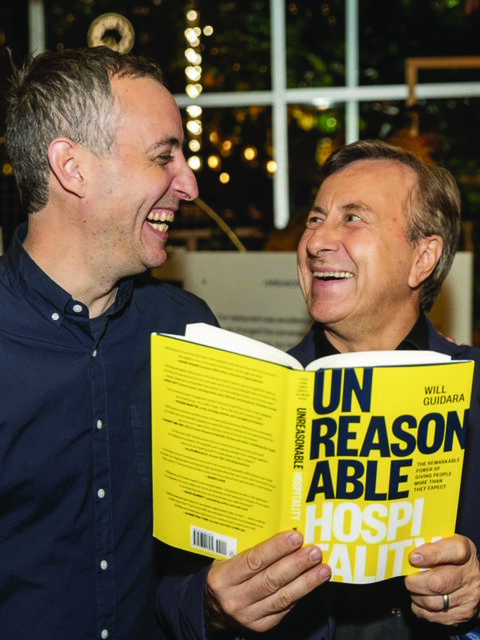
Now what that means is twofold. Unreasonable hospitality takes an ordinary transaction, and it turns it into an extraordinary experience, the kind of experience that sits with people and becomes a part of their story. The moment someone feels an emotional connection to an experience they also feel an emotional connection to the brand or the people that gave it to them. As soon as you feel connection to something, you are so much more inclined to want to interact with it over and over and over again. Not to mention the fact that, in spite of our global obsession with reading terrible headlines about how the world is going to s***, we also love telling the stories of the moments we experience joy.
I believe that any investment a company makes in unreasonable hospitality not only increases the customer retention of the person they extended it to, but that it goes much further than any dollar they could ever spend on traditional marketing. If you give someone a beautiful story to tell, they want to tell it, and they’re going to tell it over and over and over again. And it’s the most beautiful marketing you could ever hope for because it’s genuine.
The table is a scared space, and we have a responsibility to remember that. To remember that with the digital transformation thats happening in the world, there are few sacred spaces left that people gather around in hope of genuinely connecting with the people they love.
One of the greatest costs we’re all facing right now is turnover amongst the team or lots of overtime. We need to have a fully staffed operation. One of the things about unreasonable hospitality is that it’s dramatically more fulfilling for the people who work there, increasing retention, increasing contentment. And, those two things together have material impacts on the bottom line.
MENU: The idea of cultivating a sense of “belonging” within a restaurant experience is something you talk about. What does that really mean, and what, in your view, should the role of a restaurant be?
Different restaurants satisfy different needs. I genuinely believe there is a space for a restaurant that serves delicious cheeseburgers where I don’t interact with a single human being, and the technology is just so intuitive and hospitable that it minds the amount of time it takes for me to get in and out and get something delicious into my belly. I think that’s a restaurant. I think that’s great. When I think about the kind of restaurants like where you’re actually going not just to eat food, but to connect with the people you’re dining with, it’s easier for me to define a “great” restaurant, than just a restaurant generally. I think a great restaurant is one that, with intention, creates the conditions for connections—where if you and I go there, we are closer at the end of the meal than we were at the beginning. I think a great restaurant understands that the food, the service and the design are simply ingredients in that recipe of connection. One that recognizes you could order food at home or cook yourself—you’re not just going there to eat, you’re going there to feel something.
The table is a sacred space, and we have a responsibility to remember that. To remember that with the digital transformation that’s happening in the world, there are few sacred spaces left that people gather around in hope of genuinely connecting with the people they love. Think of a couple that has been married for 20 years who, when they eat together, spend half of their time ignoring one another and looking down at their phone. A great restaurant is where they forget their phones even exist, and they remember why they fell in love in the first place.
Follow Will Guidara at:
Instagram: @wguidara
LinkedIn: willguidara
